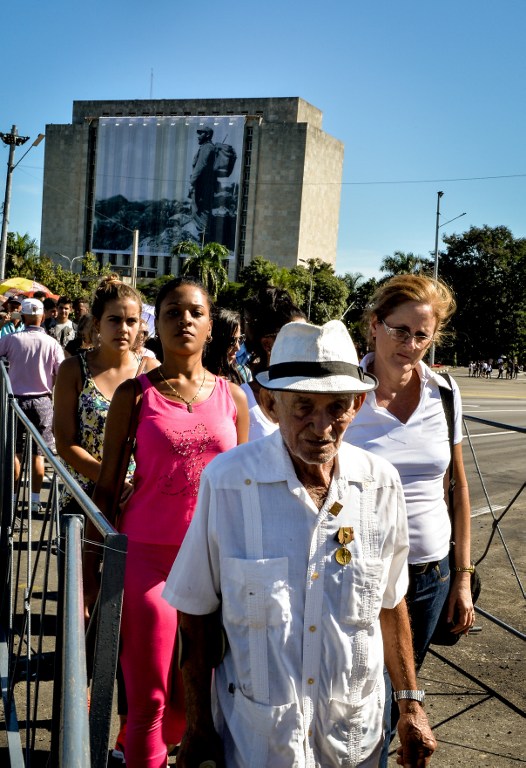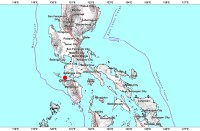
A titan of the 20th century who beat the odds to endure into the 21st, Castro died late Friday after surviving 11 US administrations and hundreds of assassination attempts. No cause of death was given. Castro’s ashes will go on a four-day island-wide procession starting Wednesday before being buried in the southeastern city of Santiago de Cuba on December 4. / AFP PHOTO / ADALBERTO ROQUE
HAVANA, Cuba (AFP) – by Laurent THOMET
Massive crowds of Cubans streamed onto Havana’s iconic Revolution Square to pay tribute to Fidel Castro on Monday, kicking off an emotional, week-long farewell to the divisive Cold War titan.
Long lines of mourners, many of whom had been waiting since before dawn, filled the square as the memorial began with a salvo of 21 cannon shots from a colonial fort overlooking Havana harbor.
They filed silently past a black-and-white picture of “El Comandante” as a young, black-bearded revolutionary, many clutching bouquets of flowers, and many in tears.
Lourdes Rivera, a 66-year-old retired civil servant, was so overcome with emotion while waiting in line that she sat on a curb and cried.
“He’s the father of all Cubans. My dad was my dad, but he couldn’t give me what (Castro) gave me. He gave me everything. My freedom. My dignity,” she said.
Castro, whose 1959 revolution toppled a dictatorship with the promise of bringing justice and equality to the Caribbean island, was a towering figure of the 20th century.
While some saw him as a socialist hero who brought education and free health care, others labeled him a “tyrant” who caused economic hardship and sparked an exodus of Cubans seeking a better life.
Hundreds of thousands of people are expected to swarm Revolution Square, where Castro would often rail against the US “empire” during his legendary, marathon speeches.
Many mourners were dressed in state uniforms — school children, soldiers, veterans, doctors and customs officers.
Luis Modesto Garcia, who at 77 is one of the last survivors of Castro’s band of rebels, called the late leader a “father.”
“We always saw him that way. Everything I know I owe to him,” he said.
“There will never be another like him,” 84-year-old Teresa Oquendo said between sobs.
Terminator Trump?
In a sign of changing times, US President Barack Obama visited Revolution Square during his historic visit to Havana in March, when he became the first US leader since 1928 to step foot in Cuba, a nation of 11 million people.
In 2014, Fidel’s brother and successor, Raul Castro, announced a diplomatic detente with Obama, who has lifted some trade barriers. On Monday, the first regular flights from the United States to the Cuban capital resumed.
But US President-elect Donald Trump renewed a threat to end the thaw unless Havana makes concessions on human rights and opening up its economy.
“If Cuba is unwilling to make a better deal for the Cuban people, the Cuban/American people and the US as a whole, I will terminate deal,” he said on Twitter.
Raul Castro has enacted gradual economic reforms. But he has firmly resisted any changes to the communist island’s political system.
Government opponents hope Fidel’s death will enable bolder reforms.
Fidel handed power to Raul in 2006 after undergoing emergency intestinal surgery. His cause of death on Friday at age 90 has not been disclosed.
‘Nothing changes’
Authorities had initially said Castro’s ashes would be displayed in an urn on the square, but there was no sign of it as the memorial began.
There was a visible police presence at Revolution Square.
Dissidents who were repressed by Castro’s regime for years said they were happy that the “dictator” had died, but called off regular demonstrations on Sunday out of deference to those in mourning.
“We’re going to remain calm, even if (Castro) is the main culprit for the misery and lack of political rights in Cuba,” said veteran dissident Jose Daniel Ferrer.
Once the nine-day period of national mourning is over, “we will continue fighting the system he created,” he said.
In Miami, where so many Cubans flocked in the past decades to escape Castro’s policies, Cuban-Americans celebrated his death with street parties throughout the weekend.
After two days of commemorations in Havana, Castro’s ashes will go on a four-day island-wide procession starting Wednesday.
They will be buried on Sunday in the southeastern city of Santiago de Cuba, the heartland of Castro’s uprising against US-backed dictator Fulgencio Batista.
Castro, who came to power as a cigar-chomping 32-year-old in combat fatigues, survived more than 600 assassination attempts, according to aides, as well as the failed 1961 US-backed Bay of Pigs invasion and the 1962 Cuban missile crisis.
He also remained defiant in the face of a US embargo that has lasted more than half a century.
Daniel Martinez, a 33-year-old cook, is not a fan of the regime but was not thrilled with the celebrations in Miami either.
“I have nothing personal against Fidel, but I am not a ‘Castrista.’ I don’t consider myself a dissident. I simply don’t like this system,” he said.
“Nothing changes here. Nothing moves.”







